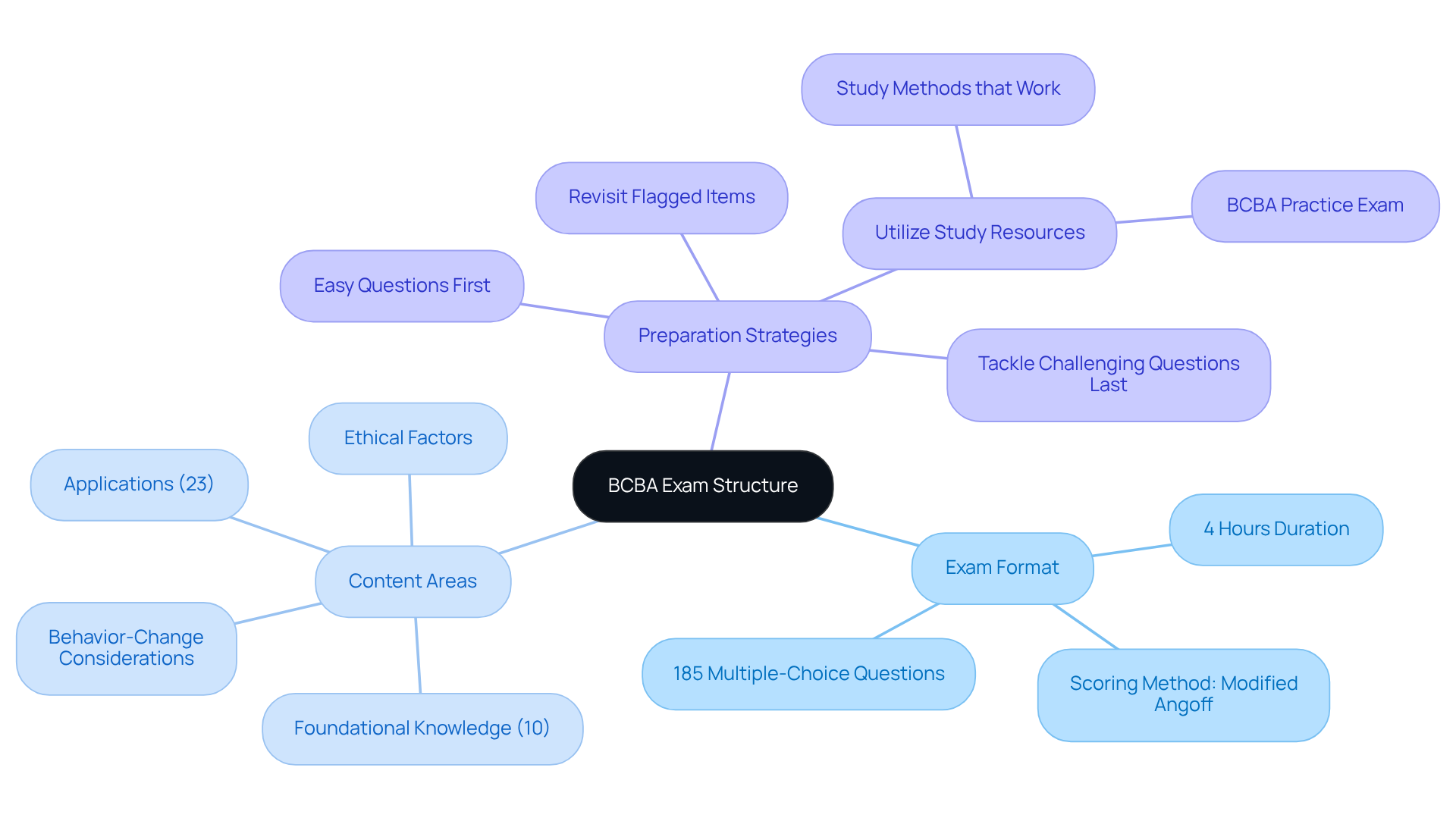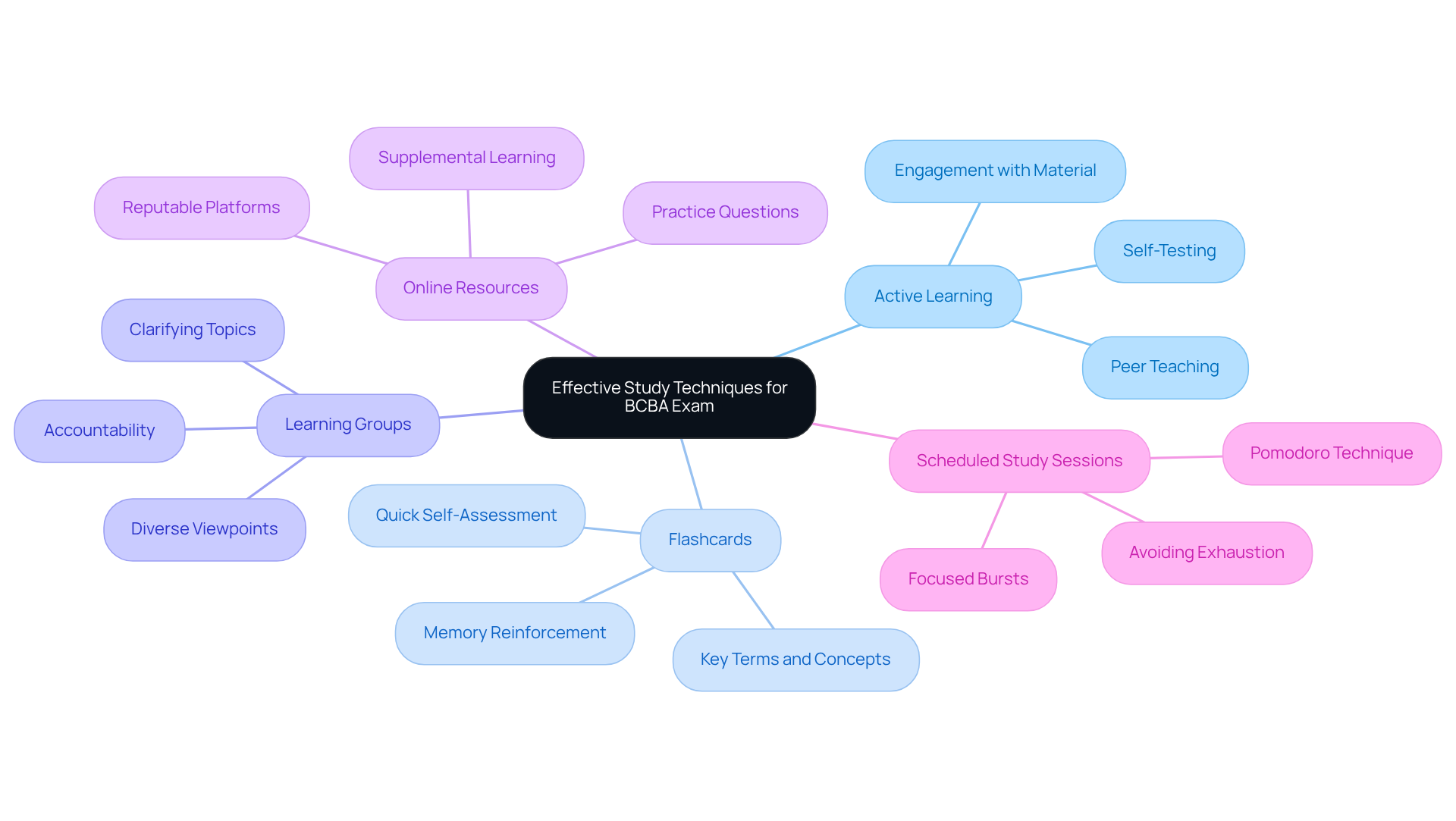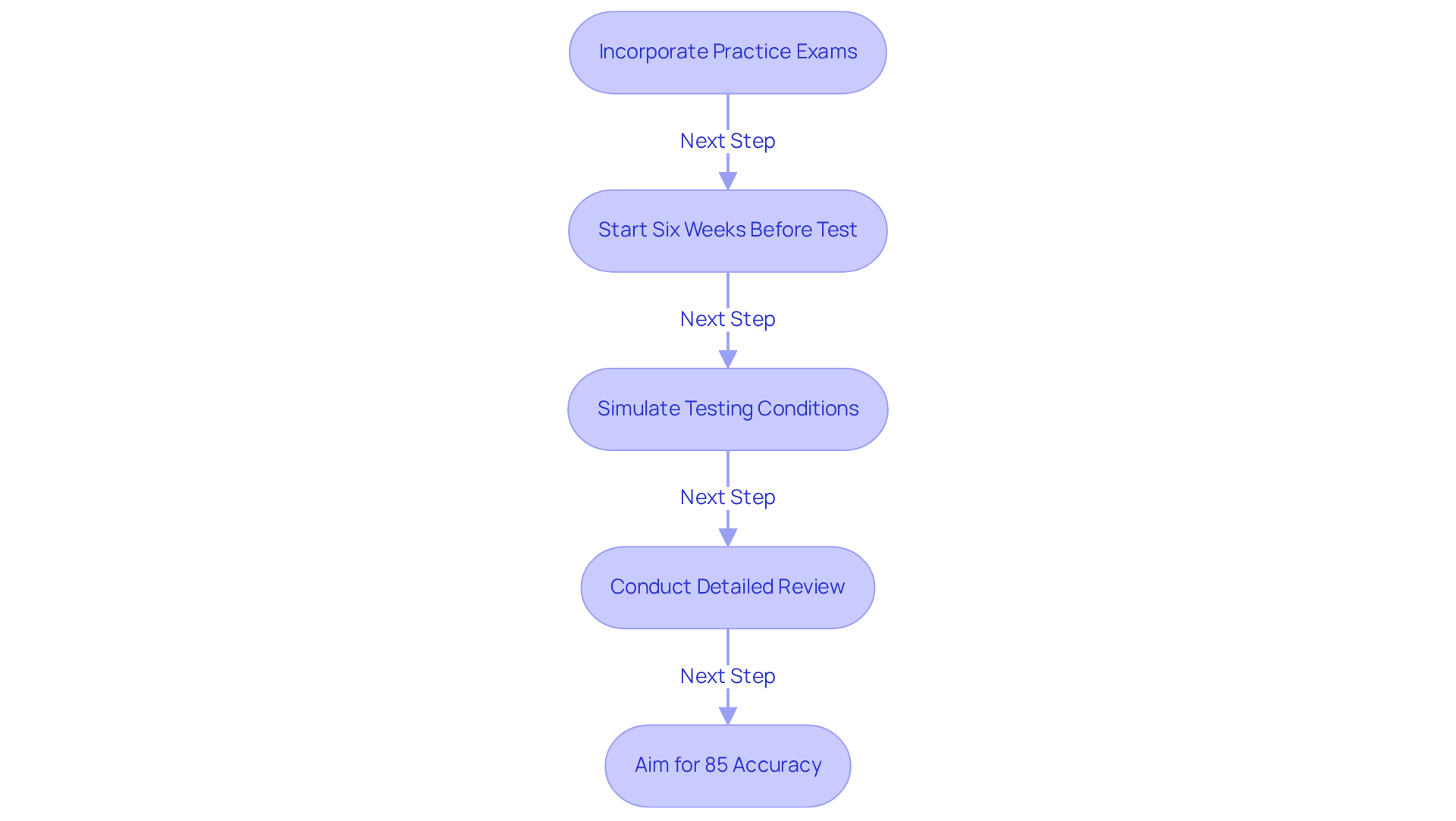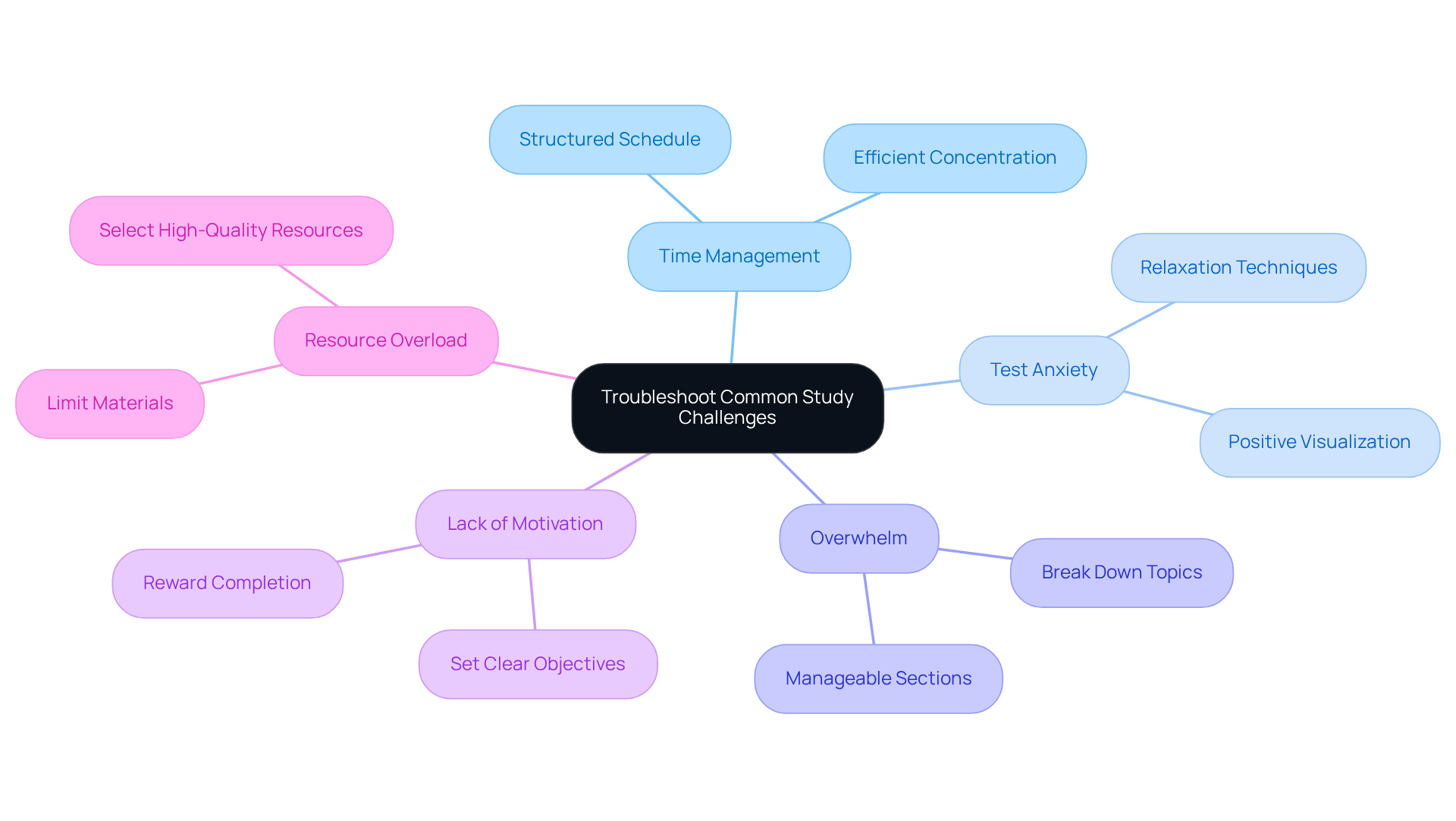September 30, 2025

Preparing for the BCBA practice exam is essential for success in this high-demand field. To navigate this challenge effectively, candidates should follow four key steps:
Evidence supports that structured preparation and active learning strategies can significantly enhance candidates' chances of passing the exam. Furthermore, regular mock testing not only boosts confidence but also addresses issues such as test anxiety and time management. Are you ready to take your preparation to the next level? Implement these strategies to maximize your potential and ensure your success.
Mastering the BCBA practice exam is a pivotal step for aspiring Board Certified Behavior Analysts. Many candidates find themselves overwhelmed by the exam's complexity and vast content. This guide offers a structured approach to preparation, emphasizing effective study techniques and the importance of practice exams.
With so many resources available, how can candidates ensure they are focusing on the right strategies to maximize their chances of success? Reflect on your current study methods—are they truly effective? This guide will illuminate the path to successful exam preparation.
The BCBA assessment is a critical milestone, comprising 185 multiple-choice questions—160 of which are scored and 25 serving as unscored pilot questions. Candidates are granted four hours to complete this assessment, which is meticulously structured around the BCBA Task List. This list outlines the essential knowledge and skills required for effective practice as a Board Certified Behavior Analyst.
Familiarizing yourself with the content outline of the BCBA practice exam is paramount; it encompasses foundational knowledge, applications, behavior-change considerations, and ethical factors. Each content area carries specific significance, guiding your learning priorities. For instance:
To optimize your preparation, consider adopting a three-pass strategy:
Furthermore, leveraging study resources such as 'Study Methods that Work: 8 Study Strategies for the BCBA® Exam' and the BCBA practice exam can provide targeted practice and valuable insights. Maintaining a calm state of mind prior to the assessment is also crucial for achieving optimal performance. Understanding the modified Angoff method used for evaluating the test can provide you with insights into how your performance will be assessed. Ultimately, reviewing materials between completing coursework and taking the test is essential for reinforcing your understanding.

To effectively prepare for the BCBA exam, consider implementing the following study techniques:
Active Learning: Engage deeply with the material by summarizing concepts, teaching others, or discussing topics with peers. This method not only strengthens comprehension but also boosts retention. Active involvement has been demonstrated to notably enhance test performance. According to the Behavior Analyst Certification Board, candidates who build a schedule and regularly self-test tend to outperform their peers.
Flashcards: Create flashcards for key terms and concepts. This method aids in reinforcing memory retention and allows for quick self-assessment, making it easier to recall information during the exam. Research suggests that utilizing diverse learning resources, including flashcards, can enhance comprehension and retention of material.
Learning Groups: Join or create learning groups to utilize diverse viewpoints and shared resources. Collaborative learning fosters accountability and can clarify challenging topics, enhancing overall comprehension. Research indicates that in-person or virtual learning groups promote peer accountability and offer diverse viewpoints, which can improve education.
Online Resources: Utilize reputable online platforms such as Study Notes ABA and ABA Tech for additional learning materials and practice questions. These resources offer valuable insights and can enhance conventional learning methods. Candidates from recognized programs have shown stronger academic foundations, resulting in improved assessment outcomes.
Scheduled Study Sessions: Implement the Pomodoro technique, which involves studying in focused bursts followed by short breaks. This strategy aids in sustaining focus and averts exhaustion, facilitating more efficient learning sessions. The average pass rate for the BCBA practice exam on the first attempt is roughly 60-70%, highlighting the significance of organized preparation.
By implementing these methods, candidates can develop a strong preparation strategy that enhances their likelihood of success on the BCBA assessment.

Including mock assessments in your study strategy is crucial for BCBA test success. Did you know that regular mock testing can significantly elevate your chances of passing? Statistics indicate that individuals who engage in consistent practice tests often achieve higher results on the actual assessment, with first-time pass rates averaging around 65%. From 2017 to 2020, the average pass rates for new candidates increased from approximately 63% to 65%, underscoring the importance of thorough preparation.
To maximize your readiness, begin completing full-length practice tests at least six weeks before your actual test date. This timeline allows you to assess your preparedness and identify areas needing further attention. To effectively prepare, replicate the actual testing environment during your training assessments. Rigorously time yourself and minimize distractions to simulate the pressure of the real test. This method not only familiarizes you with the assessment structure but also aids in managing test anxiety. Candidates who rehearse under similar conditions frequently report feeling more assured on assessment day. Poor time management is a common challenge among BCBA candidates, making this simulation essential.
After finishing each mock test, conduct a detailed review of your responses, focusing particularly on the questions you missed. Understanding your weaknesses is vital for adjusting your study plan. Aim for a minimum of 85% accuracy on mock assessments before test day; this benchmark can significantly enhance your confidence and preparedness. Additionally, ensure you cover various content areas, including ethics and intervention strategies, during your review process to achieve a comprehensive understanding.
Numerous successful BCBA applicants attribute their achievements to the practice of mock testing. For instance, candidates who frequently engaged in practice tests reported improved time management skills and a deeper understanding of the test material. By incorporating these strategies, you can strengthen your grasp of behavior analysis principles and increase your likelihood of succeeding on your first attempt. As emphasized by Blue Jay ABA, mentorship and hands-on experience are also crucial components of effective exam preparation.

To troubleshoot common study challenges, consider implementing the following strategies:
Time Management: Develop a structured study schedule that designates specific times for each topic. Adhering to this schedule fosters consistent progress and helps candidates stay organized. Efficient time management while taking a bcba practice exam also improves concentration during testing hours, enabling better focus on each question.
Test Anxiety: Employ relaxation techniques such as deep breathing exercises and visualization to alleviate anxiety. Focusing on the study process instead of the test result can greatly lessen stress and improve concentration. Additionally, positive visualization techniques can assist individuals in envisioning successful exam completion, further reducing anxiety.
Overwhelm: Simplify complex subjects by breaking them down into smaller, manageable sections. This approach allows candidates to tackle one topic at a time, minimizing feelings of being overwhelmed.
Lack of Motivation: Establish clear, attainable objectives for each learning session and reward yourself upon completion. This approach not only enhances motivation but also strengthens a positive learning habit. Remember, as Winston Churchill said, "Success is not final, failure is not fatal: it is the courage to continue that counts."
Resource Overload: Limit your materials to a select few high-quality resources, including official BACB guides and practice exams. This strategy helps prevent confusion and ensures a more focused and effective study experience for the bcba practice exam.

Mastering the BCBA practice exam is essential for aspiring Board Certified Behavior Analysts. With the increasing demand for BCBAs, a comprehensive understanding of the exam structure, effective study techniques, and the incorporation of practice assessments into preparation plans are critical. By focusing on these components, candidates can significantly enhance their chances of success, paving the way for a rewarding professional journey.
Key strategies include:
Ultimately, passing the BCBA exam is not merely about memorizing content; it requires a strategic approach to learning and assessment. By adopting these methods and maintaining a disciplined study routine, candidates can approach their exam with confidence and clarity. Embrace the challenge, utilize the resources available, and take proactive steps toward achieving your goal of becoming a Board Certified Behavior Analyst.
What is the structure of the BCBA exam?
The BCBA exam consists of 185 multiple-choice questions, of which 160 are scored and 25 are unscored pilot questions. Candidates have four hours to complete the exam.
What does the BCBA Task List outline?
The BCBA Task List outlines the essential knowledge and skills required for effective practice as a Board Certified Behavior Analyst.
What are the main content areas covered in the BCBA exam?
The main content areas include foundational knowledge (10% of the assessment), applications (23%), behavior-change considerations, and ethical factors.
What is a recommended strategy for preparing for the BCBA exam?
A recommended preparation strategy is to adopt a three-pass approach: tackle easy questions first, revisit flagged items, and address challenging questions last.
What study resources are suggested for BCBA exam preparation?
Suggested study resources include 'Study Methods that Work: 8 Study Strategies for the BCBA® Exam' and the BCBA practice exam for targeted practice and insights.
How important is maintaining a calm state of mind before the exam?
Maintaining a calm state of mind prior to the assessment is crucial for achieving optimal performance.
What is the modified Angoff method in the context of the BCBA exam?
The modified Angoff method is used for evaluating the test and provides insights into how candidates' performance will be assessed.
Why is it important to review materials before taking the BCBA exam?
Reviewing materials between completing coursework and taking the test is essential for reinforcing understanding and knowledge retention.
Our expert recruitment strategies and AI-driven sourcing ensure that you receive top-notch candidates quickly, without compromising on quality. Whether you’re looking for BCBAs, Clinical Directors, or RBTs, we’ve got you covered.